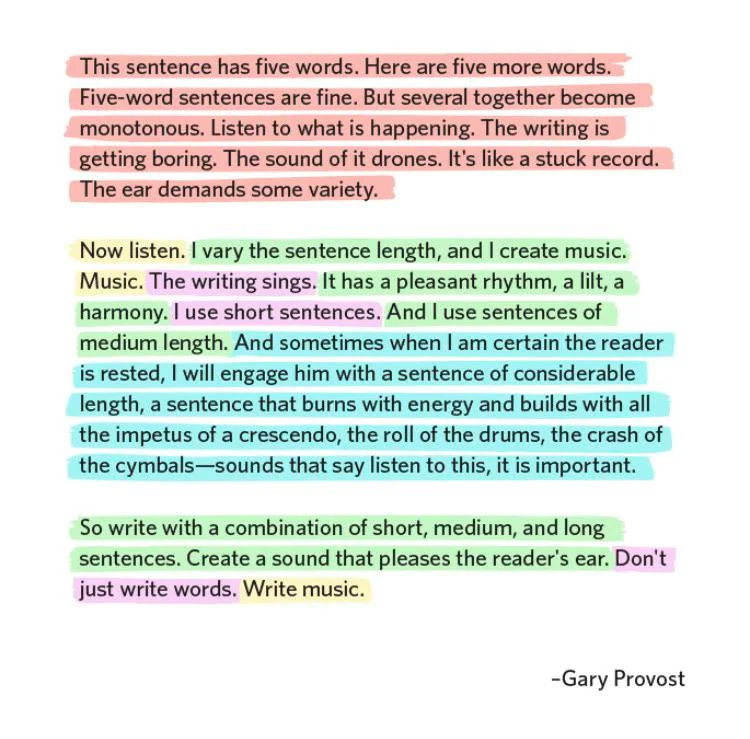4 tips to TURBO CHARGE your writing style
According to Stephen King, this is the only guide you need to instantly improve your style
When I started writing I thought finding my "voice" was simply a matter of writing and it would "sound" like me.
This could not be further from the truth. The reality is that style can be learned and worked on deliberately. People develop their sense of style when they are revising and practicing.
According to Stephen King, the only guide to style you need is The Elements of Style by William Strunk Jr. and E.B. White (author of Charlotte's Web).
I would recommend this book to anyone who wants to level up their writing style, fiction or non-fiction. The content may seem obvious, yet difficult to internalize. Once I started consciously applying these tips, I noticed instant improvements to my writing.
If you are looking to make your writing more engaging so readers will want to keep reading, you've come to the right place.
“Omit Needless Words.”
It's so obvious it's complicated.
This is something I have struggled a lot with in my writing. When I am revising, I end up cutting around 50% from my first draft. For some reason I love adding usless words like just, really, and very. It makes me cringe every time I see it. (Feel free to point them out in the comments if I ever leave one in.)
It's because early drafts are meant for clarifying are thinking. A first draft is much like an outline in that way.
When you omit needless words, you get all these other benefits.
Your post is shorter and people are more likely to read the whole thing
Your ideas become clearer.
It becomes more fun to read!
Vigorous writing is concise. A sentence should contain no unnecessary words, a paragraph no unnecessary sentences, for the same reason that a drawing should have no unnecessary lines and a machine no unnecessary parts.
"Avoid a succession of loose sentences."
This refers to a sentence that has two complete sentences combined with a comma and a connective word like but, who, and so.
I personally like me a good succession of loose sentences, and they appear frequently in literary fiction. But they are difficult to pull off because they require a lot of focus and attention from the reader. So you need to have built up reader attention with shorter sentences first before deploying them.
Long sentences cause your readers to lose focus. I once had a reader say I had a lot of "run-on" sentences (which was incorrect I may add). What they were actually say was the sentences were boring.
By making them into individual sentences you help to make your point more clear.
By the way, here is a passage from To The Lighthouse by Virginia Woolf that makes delightful use of loose sentences.
She had known happiness, exquisite happiness, intense happiness, and it silvered the rough waves a little more brightly, as daylight faded, and the blue went out of the sea and it rolled in waves of pure lemon which curved and swelled and broke upon the beach and the ecstasy burst in her eyes and waves of pure delight raced over the floor of her mind and she felt, It is enough! It is enough!
"Make the paragraph the unit of composition: one paragraph to each topic."
In his book On Writing: A Memoir Of The Craft, Stephen King elaborates on this point that the paragraph is the basic building block of writing.
The goal is to swiftly move the reader from one paragraph to the next, retaining their attention and transmitting your intended meaning. Breaking writing into separate paragraphs can make a huge impact in making writing look approachable on the page.
The key is to make each paragraph convey one idea, or serve one purpose.
Vary Sentence Length
Varying sentence length is a ridiculously effective way to make writing more lyrical and interesting.
If you noticed, most of the paragraphs in this article are only one sentence. The longer paragraphs are surrounded by shorter paragraphs.
That way the reader feels like they are always making progress.
The following example by Gary Provost does a great job of illustrating this point.




This is a great article. "Omit Needless Words.” I struggle with this to find the right balance in my nonfiction, how-to writing. My natural style has few words, and just the right words to communicate my meaning. Unfortunately, it's not conversational or interesting. That's because I've always written Business reports to quickly and clearly communicate essential information. And, procedures and instructions. In business, people want to know that essential information In the shortest, clearest form possible. However, that doesn't seem to be the case in everything else. They want it to be conversational and entertaining. I struggle to find the right position on that continuum.